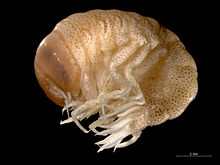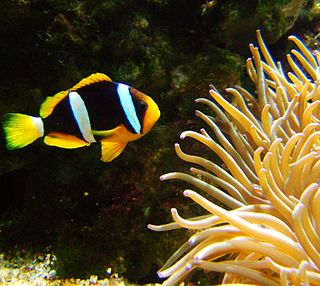
Amphiprion clarkii, known commonly as Clark's anemonefish and yellowtail clownfish, is a marine fish belonging to the family Pomacentridae, the clownfishes and damselfishes.

Bathyteuthis is the singular genus of squid in the family Bathyteuthidae, encompassing three species. None has a mantle length greater than 80 mm.
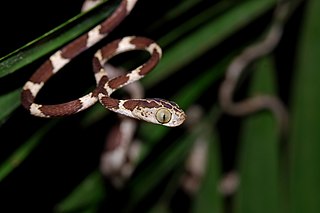
Imantodes cenchoa is a species of rear-fanged mildly venomous snake in the Family Colubridae. The species is native to in Mexico, Central America, and South America.

The common dab is an edible flatfish of the family Pleuronectidae. It is a demersal fish native to shallow seas around Northern Europe, in particular the North Sea, where it lives on sandy bottoms down to depths of about 100 metres (330 ft). It can reach 40 centimetres (16 in) in length and can weigh up to 1 kilogram (2.2 lb), though most specimens grow no longer than 20 centimetres (7.9 in).

The cherubfish, also known as the pygmy angelfish, is a species of marine ray-finned fish, a marine angelfish belonging to the family Pomacanthidae. It is found in the western Atlantic Ocean.
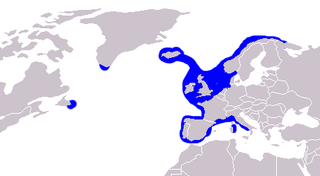
The common ling, also known as the white ling or simply the ling, is a large member of the family Lotidae, a group of cod-like fishes. It resembles the related rocklings, but it is much larger and has a single barbel. This species is unrelated to the pink ling, Genypterus blacodes, from the Southern Hemisphere. The common ling is found in the northern Atlantic, mainly off Europe, and into the Mediterranean Basin. It is an important quarry species for fisheries, especially in the northeastern Atlantic, although some doubts exist as the sustainability of the fisheries. As an edible species, it is eaten fresh, frozen, or dried, but also preserved in lye, while the roe is a delicacy in Spain.
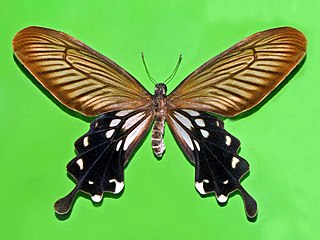
Losaria coon, the common clubtail, is a butterfly belonging to the swallowtail family, Papilionidae. The butterfly belongs to the clubtails, genus Losaria. It includes several subspecies and is found from the Nicobar Islands and Assam in India, east to Hainan in China, and south through Indochina, to Java and other islands of Indonesia and Bangladesh.

Acanthurus leucosternon is a marine tropical fish belonging to the surgeonfish family, Acanthuridae. Its common names are powder blue tang and powder-blue surgeonfish.

Neomysis integer is a species of opossum shrimp found in shallow marine bays and estuaries of Europe, with a transparent greenish or brownish body and a large cephalothorax. It is found in very shallow water in both high and low-salinity habitats. It is a filter feeder and the female broods her eggs in a brood pouch beneath her cephalothorax.

Gorgonia flabellum, also known as the Venus fan, Venus sea fan, common sea fan, West Indian sea fan, and purple gorgonian seafan, is a species of sea fan, a sessile colonial soft coral.

Hyperia macrocephala is a species of zooplankton, an amphipod in the family Hyperiidae.

Kollasmosoma sentum is a parasitoid wasp in the family Braconidae, which lays its eggs inside adult ants. It was featured as one of "the top 10 new species of 2012" in a list compiled by Conservationists at the Arizona State University International Institute for Species Exploration.

Gastrosaccus spinifer is a shrimp-like crustacean in the order Mysida, the opossum shrimps, native to the eastern Atlantic Ocean and the coasts of Northern and Western Europe.

Spicara smaris, one of the picarels, is a species of ray-finned fish native to the eastern Atlantic Ocean, the Mediterranean Sea and the Black Sea. It grows to a maximum length of about 20 cm (8 in); females are usually smaller than males.

Lethrinus harak, common names the thumbprint emperor and blackspot emperor, is a species of emperor fish.

Lethrinus mahsena, common names the sky emperor, mahsena emperor, and cutthroat emperor, is a species of emperor fish. It grows to 65 cm in length, but is commonly found at 35 to 45 cm. This fish may be yellow to greenish-blue or olive-grey, becoming paler toward the belly. It is a non-migratory, reef-associated fish that has a high commercial value.
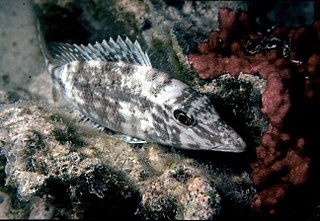
Lethrinus microdon is a species of emperor fish. It is a marine fish, bluish-grey or brown in colour with pale or somewhat orange fins. This species is reef-associated and is often found in small schools, occasionally with Lethrinus olivaceus at depths of 10 to 80 metres. It is widespread in the Indo-West Pacific and other waters. This species is caught commercially and is considered to be an excellent food fish.

Fromia indica, commonly called Indian sea star or red starfish, is a species of marine starfish belonging to the family Goniasteridae.
Hoplonemertea is an order of ribbon worms in the class Enopla. It contains two suborders:

Acanthochitona crinita is a species of marine chiton in the family Acanthochitonidae. It is found on rocky coasts in the northeastern Atlantic Ocean, the North Sea and the Mediterranean Sea.
